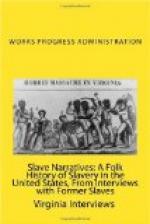(The foregoing is copied verbatim from conversation with Tinie Force, and Elvira Lewis, LaCenter, Ky. These 2 negro women are very familiar with the slavery period, as they were both slaves, and many of the facts common to that time were witnessed by them.)
LAWRENCE CO. (Edna Lane Carter)
Extract from the Civil War diary kept by Elphas P. Hylton, a Lawrence Co. volunteer in the Union Army. “On 17th of July (1864) I was detailed for picket duty and saw three thousand negro soldiers on a grand review, a black cloud to see. On the 18th I was relieved of duty. Here I became dissatisfied as a soldier on account of the negro, negro, negro. On the 23rd we began to get ready to leave this negro hole and on the 24th, to our great joy and gladness, we were sent into camp near Danville.”
McIntosh was a very progressive farmer and had a large supply of food, being a Rebel of the Rebel Army camped at the mouth of this creek near his home where they could secure food. He had a slave called “Henry McIntosh” who was drafted into the Union Army. He did not want to go but his master told him, “Well Henry you will have to go, do not steal, nor lie and be good and when you get out come on back.” He did come back and stayed here until he died, he later married and was the father of “Ben McIntosh (colored) who later lived in Hyden for years. McIntosh did not have any help on his farm after this slave was taken away from him. So he let the youth of 16 years Mr. Wooton, come to his home and help him get wood and work about the place. McIntosh had another slave but gave him to his son-in-law John Hyden, who then lived one mile up Cutushin from the Mouth of McIntosh. He had a small store which was the first store in that community.
Myth: Notions about nature when the stars fell in 1833.
At the Old Thomas Kennedy farm (Uncle Tom’s Cabin), young Tom and some more boys were playing cards in one of the negro cabins. One of the slaves went to the cabin door and called loudly, “Mas’r Tom! Come quick, the whole heavens is falling.” He continued to call. After much persuasion and repeated calls from the old negro, young Tom said, “I’ll go and see what the D—— old negro wants”. Young Tom went to the door and saw the stars raining down. He ran to the big house and jumped on a feather bed, and prayed loudly for help.
[Mrs. Jennie Slavin:]
When she was a child, Mrs. Slavin was our nearest neighbor. She said her father used to tell her these tales. William Kavanaugh was her father.
Slaves were brought and sold in Clay at one time. A large, stout negro woman in good health sold for $300 to $500. A large stout negro man sold for $1,000. Children were sold for $150 to $200. Mr. Tom Johnson, who is living now, states his father was a slave trader and was the chief sheriff of Webster Co. The runaway slaves were usually caught in this part of the country. The reward was usually $100.00.




